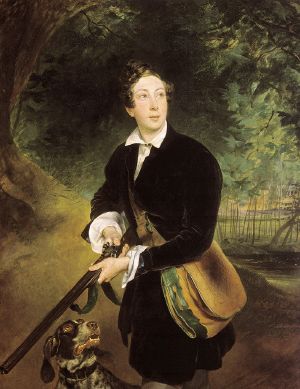Aleksey Konstantinovich Tolstoy
Aleksey Tolstoy (Russian: Алексей Константинович Толстой; September 5 [O.S. August 24] 1817 – October 10] [O.S. September 28] 1875) was a Russian poet, novelist and dramatist.
Aleksey Konstantinovich Tolstoy was born in Saint Petersburg to the famed family of Count Tolstoy. His mother A.A. Perovskaya married elderly widower count K.P. Tolstoy in 1816. The marriage was not a success - soon they openly broke up. Six weeks old, he was taken by his mother and his uncle from mather's side, A.A. Perovskiy, to the uncle's estate, were he was raised until he was eight years old, they all came back to Saint Petersburg. Soon, with the help of his uncle's connections, he was introduced to the eight years old prince, future emperor Alexander II, and became his weekend playmate among other kids of noble background. This relationship would last throughout Tolstoy's entire life. In future empress Mariya Alexandrovna, wife of Alexander II, would pay high tribute to the his talent.
In 1826 Tolstoy with his mother and uncle travel in Europe - one of the common habits of Russian wealthy noble families. In Germany he visited elderly Geote, and sited on his laps. Italy produced a great impression on the boy with her arts. With every town they visited he became more and more interested in arts.
Upon receiving good home schooling, in the mid 30th he became one of the "archive boys" at Moscow Archive of Foreign Affairs Department. As "archive student", he graduated from the University of Moscow in 1836, and was assigned to the Russian diplomatic mission in Germany. Same year his uncle died living him as a heir of great fortune.
Winter 1850-51 he met Sophia Miller, wife of cavalry colonel, during palace ball. They quickly engaged in stormy romance, and soon she left her husband. But officially they could marry in 1863, only after her formal divorse. His entire lyric poetry is addressed to her until the end of his life.
Aleksey spent most of his life at court, serving first as the Master of Ceremonies, later as Grand Master of Royal Hunting, visiting Europe on many occasions. In 1855 during Crimean War he tried to organize his own militia, which didn't work out. Instead he joined Royal Rifle Regiment, but never sow military operations. He barely survived a severe case of typhus that cut down a large part of his regiment.
In 1861 he retired from service to dedicate more time to writing poetry.
In the mid 60th his used to be robust health - he was famous for unbending horseshoes - took an ill turn. He spends a lot of his time in various resorts of Europe.
Personally he was a rare example of the person who struggled hard to avoid all possible honours and "overcome" help of those who offered various possibilities to move up his career. He wanted to be "only" artist. For this reason one of his first large poems "Ioann Damaskin", about court poet, was partially autobiographical. in spite of close friendship with emperor, he couldn't be just one of the courtiers.
Tolstoy began to write and publish poems fairly early for the time. In 1841 he published his first book "Vampire", which he totally neglected later. During this period he become well acquainted with Gogol, Aksakov, Annenkov, Nekrasov, Panayev, and particularly with Turgenev, who was release from exile owing to Tolstoy's interference. Then followed rather large gap until 1854 when he published few of his poems in journal "Sovremennik" ("Contemporary"), which immediately attracted public attention.
During 1854-1855 he participated with "Sovremennik" in creation of number of satires published under collective pen name of Kozma Prutkov. It is very hard to distinguish which part contributed by Tolstoy, but he was well known for the fine sense of humor. Some is most famous poems are full of openly expressed irony against trends of 60th, which inevitably brought a good deal of criticism, especially his sharpness against mercantile materialism that came about with beginning of industrialization of Russia.
Beside satires published under the pen name of Kozma Prutkov, he wrote admirable ballads, a historical novel, some licentious verse. Many of them are full of Slavonic themes. But his lasting contribution to the Russian literature was a trilogy of historical dramas, modeled after Pushkin's Boris Godunov. His best achievement in prose is historic novel from the age of Ivan the Terrible "Duke 'Silver'" written in traditional oral style, which doubtlessly contributed to its success among all levels of society.
He died September 28 (October 10), 1875, due to morphine over-dosage, which was prescribed for him as pain relieve from asthma, angina pectoris and neuralgia with heavy headache.
External links
- Aleksey Konstantinovich Tolstoy. Poems (in Russian)
- Love’s Ebb and Flow - a poem by Tolstoy translated into English by Alice Stone Blackwell.
Credits
New World Encyclopedia writers and editors rewrote and completed the Wikipedia article in accordance with New World Encyclopedia standards. This article abides by terms of the Creative Commons CC-by-sa 3.0 License (CC-by-sa), which may be used and disseminated with proper attribution. Credit is due under the terms of this license that can reference both the New World Encyclopedia contributors and the selfless volunteer contributors of the Wikimedia Foundation. To cite this article click here for a list of acceptable citing formats.The history of earlier contributions by wikipedians is accessible to researchers here:
The history of this article since it was imported to New World Encyclopedia:
Note: Some restrictions may apply to use of individual images which are separately licensed.
